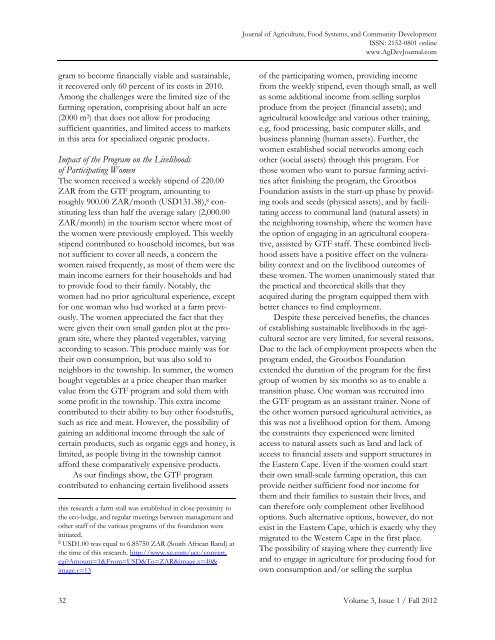Journal of Agriculture, Food Systems, and Community Development
Journal of Agriculture, Food Systems, and Community Development
Journal of Agriculture, Food Systems, and Community Development
Create successful ePaper yourself
Turn your PDF publications into a flip-book with our unique Google optimized e-Paper software.
<strong>Journal</strong> <strong>of</strong> <strong>Agriculture</strong>, <strong>Food</strong> <strong>Systems</strong>, <strong>and</strong> <strong>Community</strong> <strong>Development</strong><br />
ISSN: 2152-0801 online<br />
www.AgDev<strong>Journal</strong>.com<br />
gram to become financially viable <strong>and</strong> sustainable,<br />
it recovered only 60 percent <strong>of</strong> its costs in 2010.<br />
Among the challenges were the limited size <strong>of</strong> the<br />
farming operation, comprising about half an acre<br />
(2000 m 2 ) that does not allow for producing<br />
sufficient quantities, <strong>and</strong> limited access to markets<br />
in this area for specialized organic products.<br />
Impact <strong>of</strong> the Program on the Livelihoods<br />
<strong>of</strong> Participating Women<br />
The women received a weekly stipend <strong>of</strong> 220.00<br />
ZAR from the GTF program, amounting to<br />
roughly 900.00 ZAR/month (USD131.38), 8 constituting<br />
less than half the average salary (2,000.00<br />
ZAR/month) in the tourism sector where most <strong>of</strong><br />
the women were previously employed. This weekly<br />
stipend contributed to household incomes, but was<br />
not sufficient to cover all needs, a concern the<br />
women raised frequently, as most <strong>of</strong> them were the<br />
main income earners for their households <strong>and</strong> had<br />
to provide food to their family. Notably, the<br />
women had no prior agricultural experience, except<br />
for one woman who had worked at a farm previously.<br />
The women appreciated the fact that they<br />
were given their own small garden plot at the program<br />
site, where they planted vegetables, varying<br />
according to season. This produce mainly was for<br />
their own consumption, but was also sold to<br />
neighbors in the township. In summer, the women<br />
bought vegetables at a price cheaper than market<br />
value from the GTF program <strong>and</strong> sold them with<br />
some pr<strong>of</strong>it in the township. This extra income<br />
contributed to their ability to buy other foodstuffs,<br />
such as rice <strong>and</strong> meat. However, the possibility <strong>of</strong><br />
gaining an additional income through the sale <strong>of</strong><br />
certain products, such as organic eggs <strong>and</strong> honey, is<br />
limited, as people living in the township cannot<br />
afford these comparatively expensive products.<br />
As our findings show, the GTF program<br />
contributed to enhancing certain livelihood assets<br />
this research a farm stall was established in close proximity to<br />
the eco-lodge, <strong>and</strong> regular meetings between management <strong>and</strong><br />
other staff <strong>of</strong> the various programs <strong>of</strong> the foundation were<br />
initiated.<br />
8 USD1.00 was equal to 6.85750 ZAR (South African R<strong>and</strong>) at<br />
the time <strong>of</strong> this research. http://www.xe.com/ucc/convert.<br />
cgiAmount=1&From=USD&To=ZAR&image.x=40&<br />
image.y=13<br />
<strong>of</strong> the participating women, providing income<br />
from the weekly stipend, even though small, as well<br />
as some additional income from selling surplus<br />
produce from the project (financial assets); <strong>and</strong><br />
agricultural knowledge <strong>and</strong> various other training,<br />
e.g, food processing, basic computer skills, <strong>and</strong><br />
business planning (human assets). Further, the<br />
women established social networks among each<br />
other (social assets) through this program. For<br />
those women who want to pursue farming activities<br />
after finishing the program, the Grootbos<br />
Foundation assists in the start-up phase by providing<br />
tools <strong>and</strong> seeds (physical assets), <strong>and</strong> by facilitating<br />
access to communal l<strong>and</strong> (natural assets) in<br />
the neighboring township, where the women have<br />
the option <strong>of</strong> engaging in an agricultural cooperative,<br />
assisted by GTF staff. These combined livelihood<br />
assets have a positive effect on the vulnerability<br />
context <strong>and</strong> on the livelihood outcomes <strong>of</strong><br />
these women. The women unanimously stated that<br />
the practical <strong>and</strong> theoretical skills that they<br />
acquired during the program equipped them with<br />
better chances to find employment.<br />
Despite these perceived benefits, the chances<br />
<strong>of</strong> establishing sustainable livelihoods in the agricultural<br />
sector are very limited, for several reasons.<br />
Due to the lack <strong>of</strong> employment prospects when the<br />
program ended, the Grootbos Foundation<br />
extended the duration <strong>of</strong> the program for the first<br />
group <strong>of</strong> women by six months so as to enable a<br />
transition phase. One woman was recruited into<br />
the GTF program as an assistant trainer. None <strong>of</strong><br />
the other women pursued agricultural activities, as<br />
this was not a livelihood option for them. Among<br />
the constraints they experienced were limited<br />
access to natural assets such as l<strong>and</strong> <strong>and</strong> lack <strong>of</strong><br />
access to financial assets <strong>and</strong> support structures in<br />
the Eastern Cape. Even if the women could start<br />
their own small-scale farming operation, this can<br />
provide neither sufficient food nor income for<br />
them <strong>and</strong> their families to sustain their lives, <strong>and</strong><br />
can therefore only complement other livelihood<br />
options. Such alternative options, however, do not<br />
exist in the Eastern Cape, which is exactly why they<br />
migrated to the Western Cape in the first place.<br />
The possibility <strong>of</strong> staying where they currently live<br />
<strong>and</strong> to engage in agriculture for producing food for<br />
own consumption <strong>and</strong>/or selling the surplus<br />
32 Volume 3, Issue 1 / Fall 2012






